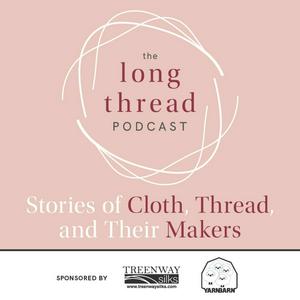Lily M. Chin, Knitting & Crochet Rock Star
In the early 2000’s, one episode of the Late Show with David Letterman boasted that a crocheter would make Dave a sweater over the course of the show. It sounded impossible, but their special guest backstage was Lily M. Chin, who held the title of World’s Fastest Crocheter. When the closing music played, Lily presented Letterman with his sweater—it was a bit short, but Dave pulled it over his head.
By that point, Lily was no stranger to either deadlines or high-profile clients, having created runway pieces for Diane von Furstenburg, Ralph Lauren, Isaac Mizrahi, and other Fashion Week icons. As a crocheter, machine knitter, and handknitter, Lily is known for her innovative techniques and bold designs.
Fashion and speed are the hallmarks of Lily’s native New York City as well as her handwork. Lily grew up at the feet of her mother, a garment worker who put a crochet hook in her hands so she’d stay out of trouble. She picked up handknitting and machine knitting, stepped off the pre-med track, and began one of the most varied and interesting careers in fiber art.
Any knitter or crocheter with a yarn collection will take heart at Lily’s solution for managing her decades’ worth of stashed yarn. With no room for it in her 650-square-foot Greenwich Village apartment, she keeps it in 9 units in a nearby self-storage facility. She doesn’t need it in her house, after all, when she travels to teach, especially on the Craft Cruises she has participated in for years.
Named a Master Knitter by Vogue Knitting International, Lily has a list of credits and affiliations as long as a skein of laceweight yarn, but her down-to-earth attitude and delight in her craft make her stories so much fun.
Links
Lily teaches frequently with Craft Cruises. (https://www.craftcruises.com/instructor_information.php?brand=1,Knitting%20Cruises&cruise=208,Ultimate%20Viking%20Explorer&dep_date=2025-06-08&dest_date=2026-06-29&instructor=Lily%20Chin) In 2025 she will be traveling to Japan and the North Pacific.
Find information about Lily’s upcoming classes, current projects, and latest adventures on her socials:
@LilyMChin on Instagram
@LilyMChin1 on Twitter
@LilyMChin on Threads
LilyMChin on Ravelry
@lilymchinnyc on Pinterest
This episode is brought to you by:
Treenway Silks is where weavers, spinners, knitters and stitchers find the silk they love. Select from the largest variety of silk spinning fibers, silk yarn, and silk threads & ribbons at TreenwaySilks.com (https://www.treenwaysilks.com/). You'll discover a rainbow of colors, thoughtfully hand-dyed in Colorado. Love natural? Treenway's array of wild silks provide choices beyond white.
If you love silk, you’ll love Treenway Silks, where superior quality and customer service are guaranteed.
KnitPicks.com has been serving the knitting community for over 20 years and believes knitting is for everyone, which is why they work hard to make knitting accessible, affordable, and approachable. Knit Picks responsibly sources its fiber to create an extensive selection of affordable yarns like High Desert from Shaniko Wool Company in Oregon. Are you looking for an ethical, eco-friendly yarn to try? Look no further than Knit Picks’ Eco yarn line. Need needles? Knit Picks makes a selection for knitters right at their Vancouver, Washington headquarters.
KnitPicks.com (https://www.knitpicks.com/)—a place for every knitter.

